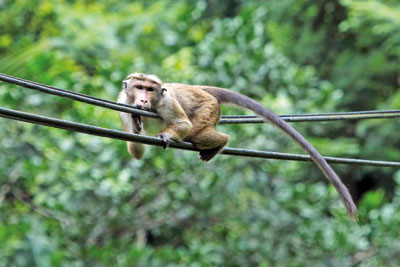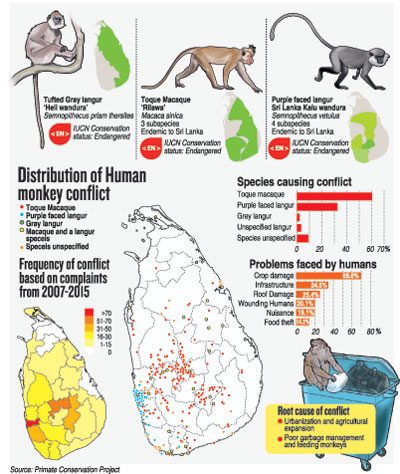News
Too much monkey business causing havoc on many fronts
Large troops of monkeys, sometimes numbering 50-100, are causing havoc in populated areas in a grab for food, with homes and public property suffering damage in many areas.
Monkey attacks come up as one of the main complaints heard at District Secretariats and agriculture-related meetings.
Monkeys are causing damage to crops, roofs, power cables, telephone lines and water lines and are even attacking people while stealing into homes to take food, a cross-section of government agents interviewed by The Sunday Times said.
The GAs say the animals target heavily-populated areas such as marketplaces, parks and public areas.
“Troops of monkeys plunder food from households, cafes and markets by breaking in through rooftops or simply entering from windows,” Polonnaruwa District Secretary Ranjith Ariyaratna said.
Polonnaruwa is beset by large groups of the reddish-brown toque macaques (Macaca sinica), locally known as rilawa, which are bolder than other monkey species and adapt to urban life.
“They enter everywhere – they don’t care whether there are people present. They attack and they grab and eat food even from people’s hands,” Mr. Ariyaratna said.
“We advise the public to be wary of monkeys as they can spread rabies and can also attack humans. It is best to stay away from them. People should not offer them food or leave garbage within their reach since food is what attracts them,” Mr. Ariyaratna said.
Both macaques and langur monkeys are found in Anuradhapura, where they jump, swing and run along telephone and electric wires, rooftops and other parts of buildings and forage for food at markets and inflict considerable damage on property, Anuradhapura District Secretary R.M. Wanninayake said.
Kurunegala Acting District Secretary R.M.R. Ratnayake said his officers are buying more air guns to drive off monkeys.
He said the Department of Wildlife Conservation (DWC) had not carried out monkey relocations as the monkeys return.
“The monkey issue is being discussed at every agricultural meeting. They eat leaves, they uproot manioc and even drink from and eat the insides of coconuts,” Mr. Ratnayake said.
“The coconut shortage was worsened by monkeys eating coconuts during the arid period, reducing the yield,” he said.
The wildlife department is proposing a pilot project to capture and sterilise macaques.
This would be a long-term project to control the rapid increase of the monkey population, the department’s Director-General, M.G.C. Sooriyabandara, said.
“This has to be perfectly planned since we are dealing with an endemic primate species which is not protected as they have become pests,” he said.
Wildlife officers need to overcome some practical obstacles such as finding ways to capture 50-100 monkeys at one time.
“The macaque is perfectly adapted to urban life. Therefore, when one gets captured the others will flee or would even attack the officers carrying out the operation,” Mr. Suriyabanda said.
He explained that the department had tried relocating monkeys away from urban habitats but had given up this practice when it found the animals returning to their old territory.
About 75 per cent of the monkey population would need to be captured and sterilised if their numbers were to be effectively controlled, the department’s Director of Wildlife Health and Chief Veterinary Surgeon, Dr Tharaka Prasad, said.
He said officers have begun purchasing surgical equipment and cages to trap monkeys in a pilot project in Kandy.
“We are also planning to estimate the population of the monkeys as part of the programme,” he said.
Dr. Prasad also said the department plans to plant tall fruit trees in areas bordering wildlife parks so that monkeys could move from forest to forest through trees without using electric wires and house rooftops.
Wildlife experts say the monkey problem is a man-made problem caused by the dumping of garbage and feeding wild monkeys.
“Monkeys have not become a problem: humans have created a monkey problem,” the wildlife department’s former director, Dr. Sumith Pilapitiya, said.
“In order to address the monkey problem, people and the government officials who are engaged in solving the issue must look at why the monkeys are coming into human-settled areas,” he said.
Dr. Pilapitiya said neither culling nor relocation was practical and that the authorities and the public must eradicate the root cause of the monkeys’ liking for human habitats.
“The main factor that draws monkeys to human habitations is human food,” Dr. Pilapitiya said.
“Tourist guides and people offer them food thinking of the good photo opportunities this would provide, but when the primates learn they have easy access to human food they will remain in urban areas, and garbage-dumping and open garbage bins provide them with food,” he said.
“If we use closed waste bins monkeys will not have access to food and will return to their habitats.
“The monkeys are only acting on instinct – we cannot blame them. It is the humans who need to change their attitudes and make a change in order to solve the problem that they have created,” he said.
Research professor and primatologist, Professor Wolfgang Dittus, who has been conducting research on toque macaques and other monkey species for more than half a century, has detected an over-population of monkeys in human habitats while forest-dwelling monkey numbers remained constant.
“When monkeys have easy access to food they don’t need to expend more energy and therefore will reproduce more, creating large troops in urban areas such as Kandy, Ratnapura, Mattala and Kurunegala,” Prof. Dittus said.
“A functional garbage disposal system is a must if we are to solve the monkey issue. Without such a system there cannot be any progress in mitigating the problem,” he said.
He said ministers should not lie in promising relocation as a solution because even though some monkeys were removed other monkeys would reside in the same area if food was plentiful.
“Sometimes the monkey issue gets worse with relocation because the animals return or take refuge in areas that they didn’t previously populate,” he said.
The government should ban littering in the same way that countries such as the United States, Canada, Malaysia and Singapore had done, with fines imposed on offenders, he said.
“In Canada and America, there are no monkeys but there are bears and raccoons and the governments of those countries have introduced animal-proof waste bins that will keep animals away from waste. It’s high time that the Sri Lankan government adopts the same system,” Prof. Dittus said.
| Ring, ring, rilawa on the line | |
| Residents in the Kataragama area keep having telephone connection problems because monkeys swing along the wires, damaging them. Some hang on the cables while others walk on them; they bite and scratch at the telephone wires to test their strength. Residents complain they are constantly having to ask Telecom to fix the wires. The Telecom authorities say while attending to repairs is their duty, catching the monkeys is none of their business. – M.N. Piyaratne |

